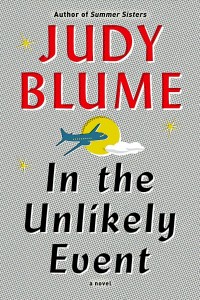I was away on holiday most of September, and that meant that I had a lot of travel time to listen to audiobooks. Brief notes follow, so I can remember what I read in my older age.

In The Unlikely Event by Judy Blume
I remember getting crap from girls in junior high when I read Are You There God? It’s Me Margaret. “But that’s a girl’s book!” The thing is, Judy Blume writes compelling characters, and so I liked the book despite it not being for boys. In The Unlikely Event follows a lot of characters living in Elizabeth, New Jersey in 1952, when three planes crashed in the suburb while trying to take off or land at the nearby Newark airport. This isn’t a set of tales of surviving as told by the victims of the crashes or their family members (mostly). It captures the daily lives of witnesses, bystanders, and responders. A lot of it is just normal stuff, but Blume uses the crashes as a device to expose their psyches. Very enjoyable, though a bit hard to keep who is who and how they are connected straight sometimes.
The Devil’s Star by Jo Nesbø
The concluding volume in the three book storyline of Harry Hole vs. the evil cop Tom Waaler. At the beginning of the novel, Hole is on his last legs as a detective. He’s convinced that Tom Waaler is behind the murder of his colleague Ellen Gjelten (in The Redbreast). Unable to prove it, he’s gone on an alcoholic bender that has his superiors draw up his termination papers. Even though he has only three weeks left before they are final, the brass has him work a case with the aforementioned Tom Waaler investigating a serial killer who leaves pentagrams at murder scenes. The reader, Harry, and Tom all know Harry’s got Tom pegged but has nothing to back it up. So how will they work together? Given that Tom Waaler has a history of murdering people who might finger him in the two previous books, I’m surprised he didn’t do the same to Harry Hole at the beginning of the book. But then, there wouldn’t be a story anymore, so we have to suspend some disbelief. Lots of tension here, and worth a listen.
How To Be Black by Baratunde Thurston
Part memoir, part humorous “self-help” on race relations. The self-help is ostensibly directed at black people, but it didn’t really feel like that was his true audience. It really comes across more as a way to explain to white people what tics black people have developed as a result of micro-aggressive racism from white people, and what methods they’ve devised in order to deal. I don’t think the latter part meshed all that well with the memoir part. You constantly jump between intensely personal memoir chapters to more distant “hypothetical” how-tos on race. Hypothetical in quotes because, while I am sure the situations are all real, Mr. Thurston doesn’t talk about them in first person voice or even third person description of what’s happened to people he knows. Those parts are in second person. Still, had those points been made how we normally make them, the book might not have garnered the attention it did. I liked the personal bits more though, particularly the writing about Sidwell Friends and race relations at that school.
Discover more from King Rat
Subscribe to get the latest posts sent to your email.